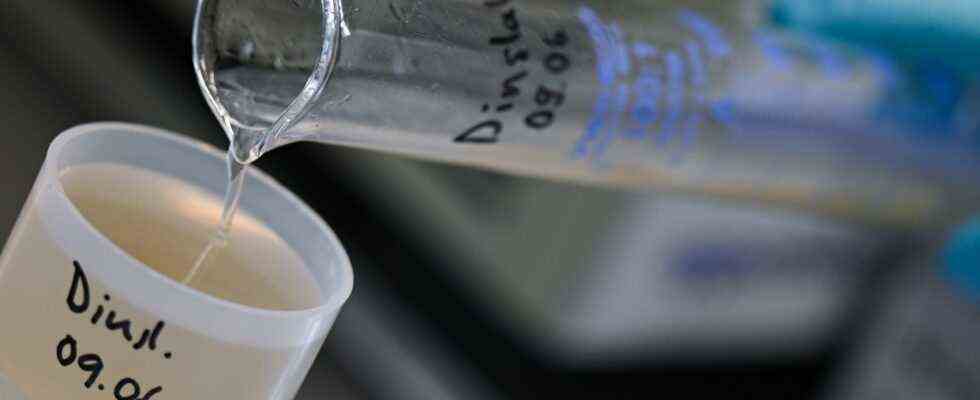background
Status: 07/09/2021 9:51 a.m.
Days often pass between the increase in new corona infections and detection by test. SARS-CoV-2 spread via wastewater can be detected more quickly. So far Germany has only relied on it in individual regions.
From Notker Blechner,
tagesschau.de
In pre-Corona times, Bad Reichenhall mainly attracted spa guests who came because of the brine source with the salty water. Now it is mainly politicians and water experts who come to the salt city. Your interest is in that Dashboard operated by the Berchtesgadener Land district office. It should detect the spread of the corona virus in the district’s wastewater at an early stage.
Berchtesgadener Land as a pioneer
“In cooperation with the Berchtesgadener Land district, we implemented the dashboard cheaply and easily, without burdening the health authorities,” explains Jörg Drewes from the Chair of Urban Water Management at the Technical University of Munich. He and his team supported the district in developing the system.
With its wastewater monitoring in the fight against Corona, the Berchtesgadener Land is one of the pioneers in Germany. Several cities and municipalities are planning similar systems. The EU Commission is demanding that the member states “set up effective wastewater monitoring systems as quickly as possible” – by October 1st.
In some countries, wastewater monitoring for corona detection is already being used across the board.
Image: picture alliance / ANP
“Monitoring wastewater can be an inexpensive, fast and reliable source of information on the spread of the virus and its variants,” said EU Environment Commissioner Virginijus Sinkevicius.
Significantly faster search for sources of infection
In fact, examining the wastewater allows for a faster search for sources of infection than testing the population. When evaluating sewage treatment plants, “we have a lead time of seven to ten days before the official number of cases,” says wastewater expert Drewes. Anyone who becomes infected must first notice this. Often the symptoms are absent or appear later. Until the test is successful, the samples are analyzed and the report is made to the health department and finally to the RKI, it will take some more time.
Virus detection happens faster in wastewater. People who become infected shed the virus. The wastewater samples are then analyzed within a day. It is true that the virus is quite battered by bacteria, heat and cold in the wastewater. The genetic material is preserved for days.
Selective projects
In addition to the Berchtesgadener Land, some large cities such as Berlin, Munich, Hamburg, Cologne, Frankfurt and Leipzig are now taking wastewater samples. Several federal states and the Federal Ministry of Research finance relevant research projects. However, there has so far been little cooperation with the health authorities. The comprehensive wastewater monitoring required by the EU is still a long time coming – also because of the unclear financing.
There are also other countries. The Netherlands, for example, controls its sewage network across the board for coronaviruses. Austria, Switzerland and France also operate systematic wastewater monitoring. The large water companies such as Suez and Veolia are also involved and carry out pilot projects.
Coronaviruses can be detected in wastewater for days.
Image: picture alliance / dpa
Germany is lagging behind
“Germany is very slow,” criticizes Susanne Lackner, professor at TU Darmstadt. There is a lack of a pragmatic approach and politicians who are willing to “push something like this and finance it”. They hide behind a lack of standardization and ongoing research projects.
In March, the researchers at TU Darmstadt took wastewater samples from 54 sewage treatment plants in 20 European countries as part of an EU proficiency test. “We were able to clearly show that we increase the SARS-CoV-2 concentrations in the wastewater around five to ten days before the increase in the incidence values,” says expert Lackner.
Lackner welcomes the increasing initiatives from business and research. “There are now many sewage treatment plant operators who commission analyzes on their own initiative.” In addition, there are companies from wastewater analysis that offer tests. And large international companies such as Veolia and Suez have also taken up the topic.
German system exported to Japan
For the Jena-based company Analytik Jena, the Covid early warning system could even become an export hit. The wastewater process, in which the samples glow the more the higher the corona load in the water, is already being used in Japan. The great advantage of the anonymized mass test in the sewage treatment plant is that the total population and thus also the number of unreported asymptomatic and weakly symptomatic cases is recorded, says Analytik-Jena boss Ulrich Krauss. “This takes place earlier than the individual testing including contact tracking.”
Krauss hopes that there will be clear political will and the corresponding willingness to invest so that corona early detection systems will prevail in wastewater in Germany. “In relation to the benefits, the system is neither expensive nor too complex.” The process and technology for this are available, and the process could prove itself in the future as part of the critical infrastructure for the detection of other health-relevant data, for example in the case of flu outbreaks or for the detection of antibiotic-resistant germs.

